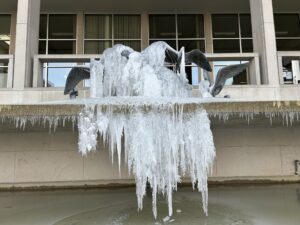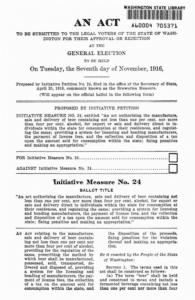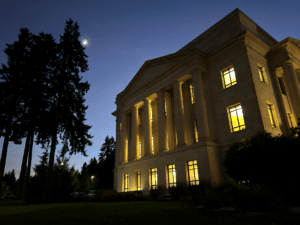
Notes From Olympia: Jan. 19, Week 2 of the 2024 Legislative Session
This edition includes bill highlights from week 2, a look ahead at key early learning related bills on deck for next week, trivia and much more.

A frozen Du Pen fountain on the Capitol Campus
(Photo Credit: Erica Hallock)
Trivia!
Initiatives to the Legislature
Back in 1915, the Washington State Legislature failed to act on an initiative to the Legislature, “the Brewers’ Hotel Bill,” sending the issue to the voters as Initiative Measure 24 for their consideration in the November 1916 general election. The voters soundly defeated Initiative Measure 24 with 48,354 voting yes and 263,390 voting no.
What subject did the “Brewers’ Hotel Bill” cover?
Week Two is Almost in the Books!
This short legislative session is setting into a rhythm, with the first cutoff (policy committee cutoff) a mere 12 days away. The winnowing of bills (and dreams) has already begun, and lobbyists have the benefit of fewer bill numbers to recall off the top of their heads!
While week one’s theme was food and parking, week two’s theme was weather. Like the rest of the state, it has been COLD in Olympia (as evidenced by the picture of the frozen Du Pen fountain above). With pass closures, slippery roads and the availability of virtual participation in legislative activity, the number of people on-campus is notably lighter than in previous years.
Yet, even with the cold, we see people participating in organizational lobby days on the Capitol campus. This week, I saw students from higher education institutions calling for more affordable college as well as a number of people wearing badges from the Wheat Association. I got very excited thinking there might be free cinnamon rolls from the Wheat Association, but I was unsuccessful in finding any. Perhaps another day.
On Martin Luther King Jr. Remembrance Day, both the Senate and the House held celebrations honoring the late Dr. King and his legacy. Dr. King strongly believed in the power of civic engagement; what a way to celebrate him by seeing it all in action.
This is a reminder that Washington’s legislative session “clock” counts all seven days a week (meaning even weekends count toward this year’s 60-day session). It is not unusual for weekend legislative activity to be scheduled, and we already expect two Saturday fiscal committee meetings and additional weekend floor activity. The Washington Legislature moves at a fast pace! In addition, as evidenced by Monday’s activity, our Legislature works on the two federal holidays during our sessions – Dr. Martin Luther King Jr. Day and Presidents Day. This provides opportunities for the public to engage more fully on what are typically days off from work for many Washingtonians.
Bill Activity Highlights
A number of early learning related bills had public hearings throughout this second week of the legislative session. Due to our publication schedule, we will include a summary of hearings related to HB 2195 (Representative Callan) Early Learning Facilities, SB 5870 (Senator C. Wilson) Expanding and Streamlining Eligibility for Early Learning Programs, and SB 6018 (Senator C. Wilson) Designating Early Learning Coordinators at Educational Service Districts in next week’s newsletter.
On Jan. 17, the Senate Early Learning and K-12 Committee passed Substitute Senate Bill 5774 by Senators Billig and C. Wilson. This bill requires the Department of Children, Youth and Families to maintain the ability to perform fingerprint background checks in at least ten of its child welfare and early learning field offices. The substitute bill prioritizes geographic locations and limits the staff support to .25 FTE to each office location. The measure now moves to the Senate Ways and Means Committee.
What’s on Deck for Next Week?
This short session started off with a bang and a flurry of bill hearings and executive sessions right out of the gate. As noted above, the first cutoff for policy committees is quickly approaching on Wednesday, Jan. 31.
As noted in last week’s Notes From Olympia, a huge volume of legislation was pre-filed and introduced during the first week of the legislative session. With that said, the bill introductions have slowed down considerably and if bills have not yet been scheduled for a policy committee hearing, the likelihood they will move forward in this short 60-day session is becoming less and less. We will focus on our state’s fiscal outlook in later newsletters as we transition into the fiscal committee timeframe. Still, the state’s budget outlook is not as flush as previous years, which also impacts decisions about scheduling bill hearings.
The committee schedule for week three has been released and – at least for the time being – it is notably lighter as it relates to early learning bills. We are at the stage of the legislative session, though, where bills are constantly added and removed from committee schedules. This is all to say it can change on a dime, so if you are tracking a particular bill, it is a good idea to keep a close eye on its status via leg.wa.gov.
On to next week …
Child Care and Tax Relief
Three bills have been scheduled related to leveraging our state’s tax system to support child care:
- HB 1716. The House Finance Committee will hear HB 1716 by Representative Rule Jan. 23. This bill would establish a Business & Occupations Tax Credit for businesses that provide child care assistance to employees. Now you might be wondering, wasn’t that bill heard last year? If you are thinking that, you would be correct. HB 1716 was introduced by Rep. Rule in 2023 and received a hearing in the House Finance Committee March 23, 2023. During the second year of a two-year legislative session, bills that did not pass in the first year are reintroduced and retained in their current status, so HB 1716 was eligible for another public hearing in the House Finance Committee.
- HB 2322. The House Finance Committee will also hear HB 2322 by Representative Senn Jan. 23. This bill would require entities receiving tax preferences from the State of Washington to provide child care assistance to their employees.
- SB 6038. Finally, the Senate Ways and Means Committee will hear SB 6038 by Senator Claire Wilson Jan. 25. This bill contains two primary provisions: 1) it would eliminate child care licensing fees and 2) provide for a tax preference to expand the business and occupation tax exemption to include income derived from child care.
A Good Little Bill for Families
- HB 2052. By Rep. Callan would provide that any construction or renovation in which public restrooms are required, baby diaper changing stations must be included. The bill has been scheduled for a public hearing in the House Local Government Committee Jan. 23 and an Executive Session Jan. 26.
Executive Sessions Scheduled
Two bills of note (in addition to HB 2052 noted above) are scheduled for Executive Session next week:
- SB 6109. Primarily related to child welfare, the bill also includes a provision related to home visiting. This bill is scheduled for Executive Session (vote) in Senate Human Services Jan. 22.
- HB 2243. By Representatives Reeves and Waters would create the children’s social equity land trust wherein funding for child care deserts would be generated by revenue from working forests statewide. Its public hearing is scheduled after the publication of this newsletter (Jan. 19 at 10:30 a.m.) in the House Committee on Agriculture and Natural Resources. Next week’s committee schedule shows an Executive Session Jan. 26.
Bill Tracker
As the legislative session progresses, our resource page will update with a weekly bill tracker. Please note that legislation changes quickly, so the version on our website may not represent a bill’s latest version as it is published the Thursday of each week.
Trivia Answer
What subject did the “Brewers’ Hotel Bill” cover?
Beer! Initiative 24, also known as the “Breweries Measure” or “The Brewer’s Hotel Bill,” was proposed to authorize the manufacturing and regulation of beer between 1 and 4% alcohol. While the motivation for voters rejecting this measure in 1916 is unclear, I do wonder if it had something to do with the Prohibition era – something to research for another day.
 Source: Washington Secretary of State
Source: Washington Secretary of State
Before we dive into the real subject of our trivia (which is not actually beer), my first observation is about the growth in our state’s population in the past 100 or so years. According to the Washington State Secretary of State, as of the November 2023 general election, our state had 4.8 million eligible voters, nearly 1.8 million of whom voted. Quite a jump from the roughly 300,000 people who voted back in 1916.
The real purpose of this week’s trivia is to talk about Initiatives to the Legislature. Over the past few weeks, much of the press throughout the state has been dominated by coverage of the proposed six initiatives to the Legislature that are in varying stages of signature verification by the Secretary of State. Given that this is not a typical occurrence (at least from my perspective), we thought it would be helpful to provide an overview of the process and the options before the Legislature should any/all of the six initiatives to the Legislature be certified.
Of the six, the Secretary of State has verified sufficient signatures for the following three (as of this writing) and notified the Legislature they have been certified as Initiatives to the Legislature:
- Initiative Measure No. 2081 concerning parental rights relating to their children’s public school education.
- Initiative Measure No. 2113 concerning vehicular pursuits by peace officers.
- Initiative Measure No. 2117 concerning the prohibition of carbon tax credit trading (AKA the Climate Commitment Act – or CCA).
There are three remaining initiatives to the Legislature that have been granted provisional certification while the signatures are being verified:
- Initiative Measure No. 2109 concerning the repeal of the capital gains tax.
- Initiative Measure No. 2111 concerning taxes and avers that the state (and its subdivisions) may not charge any individual person a tax based on their income.
- Initiative Measure No. 2124 concerning state-run, long-term care insurance and would give individuals the opportunity to opt out.
What does this mean and what comes next?
In 1912, Washington became one of the first states to adopt an initiative and referendum process, giving its voters an opportunity to make and remake laws. Any registered voter can propose an initiative to create, amend or repeal a law (although they cannot change the state constitution).
Generally speaking, the initiative process allows the voters to enact new laws or change existing ones. Washington state provides two initiative opportunities:
1. Initiatives to the Legislature. An Initiative to the Legislature is submitted to the Legislature during the legislative session should it garner sufficient certified voter signatures (currently at least 324,516 Washington registered voters).
After an Initiative to the Legislature’s is certified, the Legislature has three potential actions:
- Adopt the initiative as proposed by the public. If this happens, the initiative becomes law without a vote by the people.
- Reject the proposed initiative or take no action. In this case, the initiative would be placed on the ballot in the state’s next general election for voter consideration.
- Approve an amended version of the proposed initiative. In this case, both the amended and the original versions of the bill would appear on the state’s next general election ballot.
There is a lot of chatter and speculation over what option the Legislature will take with the potential six Initiatives to the Legislature before them. These Initiatives to the Legislature are certainly “taking up a lot of oxygen” and also have significant budget implications, particularly given the potential for the repeal of the Climate Commitment Act and capital gains tax (which the U.S. Supreme Court refused to take up just this week).
2. Initiatives to the People. Initiated by voters, allows voters to put proposed legislation to the ballot at the next general election if sufficient signatures are gathered.
For a real-time tracking of the signature verification process for the 2024 Initiatives to the Legislature, refer to the Secretary of State webpage.
A Couple of Examples of Previous Initiatives Submitted to the Washington State Legislature:
- 2014: Initiative Measure No. 658 sought legislative approval for a King County tax to fund scarecrows as public art projects and a method to discourage crows from nesting in areas where they bother citizens.
- 2017: And, finally, given that it’s NFL playoff season, I would be remiss if I did not note the proposed 2017 Initiative to the Legislature that did not garner enough valid signatures related to playing fantasy football for money. (And a personal note, who didn’t well up watching Jason Kelce leave the field for the last time?).
For an inclusive list of all the state’s past initiatives (dating back to 1996), visit the Secretary of State website.
Source: Initiatives & Referenda Handbook (Office of the Secretary of the State)
 A beautiful Monday night outside the Senate John A. Cherberg building
A beautiful Monday night outside the Senate John A. Cherberg building
(Photo Credit: Erica Hallock)
About the Author

Erica Hallock
Director, Policy & Advocacy, Start Early Washington
Erica Hallock serves as the Director of Policy and Advocacy for Start Early Washington. She has worked in early childhood, health and human services policy in both California and Washington state.
More Like This
Contact Us
Connect with our team to learn more about our work or discuss how we can support policy and advocacy work for your organization.
Washington State Hub
Learn more about our work in Washington state and access relevant resources and publications.
